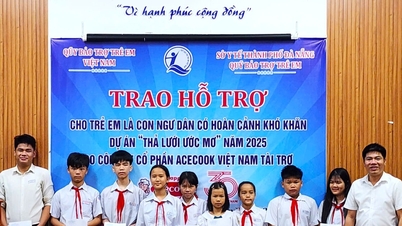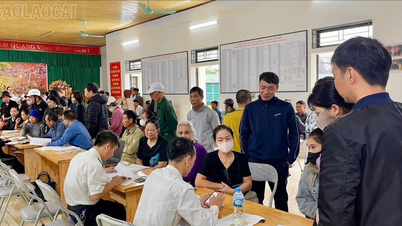
Nowadays, as more and more parents are concerned about their children's health, the use of supplements such as multivitamins, minerals, probiotics or immune-boosting products has become more popular than ever.
The market for these products is growing rapidly, but with it comes potential risks if not used properly. Health experts warn that supplements do not always have positive effects and can even have the opposite effect.
1. Understand the nature of dietary supplements - "nutritious" but not medicine
Supplements are often seen as a quick fix to address nutritional deficiencies in children. However, medical experts advise that if a child already has a varied and balanced diet, supplementation is unnecessary.
Most importantly, dietary supplements cannot cure diseases nor can they replace specific medications. However, many parents still mistakenly believe that they are a “miracle drug” that can help strengthen children’s resistance or promote outstanding development. This thinking can easily lead to misuse and the risk of long-term harm.
2. Potential risks of using dietary supplements incorrectly
Improper use of dietary supplements can cause many serious health consequences.
Vitamin and mineral overdose
In children, because their bodies are still small and their metabolism is not yet fully developed, supplementing nutrients beyond the necessary level can lead to serious consequences:
- Vitamin A overdose can cause headaches, nausea, digestive disorders and if prolonged will seriously affect liver health.
- Vitamin D overdose increases blood calcium levels, causing loss of appetite, constant thirst and damage to kidney function.
- Iron overdose can cause constipation, abdominal pain and in severe cases can lead to dangerous poisoning.
Some supplements contain many times more nutrients than the recommended daily intake, which can easily lead to children accidentally exceeding the safety threshold if not properly controlled.

Allergies and drug interactions
Children's immune systems are not fully developed, so the risk of allergies is higher than that of adults. Some ingredients in dietary supplements such as milk protein, soy or seafood; flavors, preservatives; inappropriate probiotics can cause allergies. Allergic reactions can appear as mild as redness or itching, but there are also serious cases leading to difficulty breathing or anaphylactic shock.
Additionally, supplements can interact poorly with medications your child is taking. For example, iron can reduce the absorption of some antibiotics, while vitamin K can potentially affect the effectiveness of anticoagulants.
Parents' lack of understanding or inattention when combining many products at the same time can inadvertently endanger children's health.
Unproven and overhyped effects
Many dietary supplements on the market today are advertised with attractive promises such as "rapid height increase", "optimally enhance resistance" or "support the development of outstanding intelligence for children."
However, most of these messages have not been fully verified through clinical studies. Some products do not even meet the quality standards published on the label, may contain banned substances, exceed the safety threshold, or include herbs of unknown effectiveness. Shopping habits based on trends, blindly trusting advertisements or recommendations from influencers often lead to choosing poor quality or unsafe products.

Children with anorexia due to "virtual fullness" from nutritional supplements
Excessive consumption of supplements can reduce appetite in children, leading to dependence on these supplements instead of maintaining a natural, long-term diet, causing nutritional imbalance.
Nutritionists stress that anorexia in children can be a result of parents overusing vitamins and minerals. This creates a false sense of “fullness” in children, making them reluctant to consume more food from a daily diet that provides a variety of nutrients.
Negative effects on the digestive system and natural immunity
Some popular supplements such as probiotics, zinc or lysine are often used widely. However, if overused, they can cause serious problems such as imbalance of intestinal microflora, prolonged diarrhea or constipation.
In particular, excessive use of these products can affect the body's ability to synthesize digestive enzymes, weakening natural functions.
Besides, if using food supplements with the purpose of "enhancing resistance," the risk that the child's natural immune system will not fully develop is very high.
Poisoning from substandard products
There have been many reports of dietary supplements circulating on the market being contaminated with bacteria, heavy metals, containing stimulants or not meeting the declared content on the packaging. Especially for young children, just a small mistake in the production or inspection process can lead to serious health consequences.
The above risks highlight the importance of using dietary supplements responsibly and under the advice of a healthcare professional to protect overall health, especially for children – the most vulnerable group.
How to use food supplements safely for children?
- Only supplement when prescribed by a doctor: Do not buy or use on your own based on folk experience.
- Prioritize supplementation through natural foods: Fruits, vegetables, meat, fish, and milk are sustainable sources of nutrition.
- Read product labels carefully: Check content; origin of production; ingredients that may cause allergies.
- Monitor your child's reaction when using: If there are any unusual signs, stop using immediately and take your child to see a doctor.
- Do not use many types of supplements at the same time: It can easily lead to nutrient duplication or overdose./.
Source: https://baolaocai.vn/rui-ro-tiem-an-khi-dung-thuc-pham-bo-sung-cho-tre-ma-khong-theo-chi-dinh-post887265.html


![[Photo] National Assembly Chairman Tran Thanh Man holds talks with President of the Senate of the Czech Republic Milos Vystrcil](/_next/image?url=https%3A%2F%2Fvphoto.vietnam.vn%2Fthumb%2F1200x675%2Fvietnam%2Fresource%2FIMAGE%2F2025%2F11%2F21%2F1763715853195_ndo_br_bnd-6440-jpg.webp&w=3840&q=75)
![[Photo] President Luong Cuong receives Speaker of the Korean National Assembly Woo Won Shik](/_next/image?url=https%3A%2F%2Fvphoto.vietnam.vn%2Fthumb%2F1200x675%2Fvietnam%2Fresource%2FIMAGE%2F2025%2F11%2F21%2F1763720046458_ndo_br_1-jpg.webp&w=3840&q=75)
![[Photo] Visit Hung Yen to admire the "wooden masterpiece" pagoda in the heart of the Northern Delta](/_next/image?url=https%3A%2F%2Fvphoto.vietnam.vn%2Fthumb%2F1200x675%2Fvietnam%2Fresource%2FIMAGE%2F2025%2F11%2F21%2F1763716446000_a1-bnd-8471-1769-jpg.webp&w=3840&q=75)


![[Photo] General Secretary To Lam receives President of the Senate of the Czech Republic Milos Vystrcil](/_next/image?url=https%3A%2F%2Fvphoto.vietnam.vn%2Fthumb%2F1200x675%2Fvietnam%2Fresource%2FIMAGE%2F2025%2F11%2F21%2F1763723946294_ndo_br_1-8401-jpg.webp&w=3840&q=75)










































































































Comment (0)